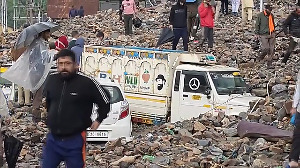The disturbing phenomenon that we have been seeing for some years is alienation of our minorities due to accumulation of unaddressed grievances. Unless these are addressed sincerely and effectively, this could degenerate into radicalisation, warns B Raman.
A recent television show was on the important and sensitive subject of prejudices against the minorities in India.
The discussion, which was conducted with sensitivity and candour, was triggered off by a complaint addressed to the National Minorities Commission by a retired Muslim major of the Indian Army, alleging that he was subjected to improper treatment by some staff of a flight of the SpiceJet on grounds of his religion and removed from the flight for security reasons, which he has contested as false.
Spicejet, which did not avail of an invitation from the channel to reply to the allegations, had sent a written rejoinder refuting the allegations. The complaint will be inquired into by the commission.
The major had done the right thing in submitting a formal complaint the commission. Its inquiries will indicate whether his allegations are correct and, if so, what amends are called for. The inquiry and any follow-up action, if his allegations are correct, will have a deterrent effect on the staff of all airlines and prevent similar instances in future.
While I do not rule out the possibility of aberrations by individual members of staff, one should not generalise from a single reported instance of inappropriate behaviour that there is religious profiling in our civil aviation sector. The major admitted that he had previously travelled by the same airline and had faced no unpleasant experience. I travel by air often and have not come across any instance smacking of religious profiling.
The debate also focussed on the larger and what ought to be more disturbing aspect of prejudices from various sections of our society against the minorities in general and Muslims in particular. One cannot deny that there are perceptions in sections of the Muslim community that they are subjected to unfair and discriminatory behaviour by sections of the administration, particularly by the police.
Some Muslims arrested in the past for their alleged involvement in acts of terrorism did not cite discrimination against them in matters of educational and job opportunities to explain their alienation. Instead, they cited what they described as the unfair and discriminatory attitude of the Indian criminal justice system towards the Muslims. By criminal justice system, they mean the police and the judiciary.
This is also a complaint often voiced by organisations such as the Students' Islamic Movement of India and the Indian Mujahideen. They complain that Muslim suspects are treated by the police much more harshly than non-Muslims and, when convicted, awarded much harsher sentences than non-Muslims.
The IM often points out that while quick and severe action was taken against Muslims allegedly involved in the post-Babri Masjid communal disturbances in Mumbai, no action was allegedly taken against the non-Muslim officers found guilty by the Sri Krishna Commission of over-reaction against Muslims.
These are the kind of perceptions which can be dealt with effectively by the government and the police without the need for more laws. What is required is improved behaviour by our criminal justice system towards Muslims.
Many, if not most, of the complaints of our Muslims, particularly the Muslim youth, are against the police and other uniformed security personnel. They have every right to act firmly against wrong-doers to whatever community or religion they might belong. At the same time, they should avoid giving to Muslims and other minorities the impression of double standards in dealing with the minorities.
Since the 9/11 terrorist strikes in the US, the debate on counter-terrorism has been considerably monopolised by Western scholars and experts who have introduced concepts and ideas such as the alleged reluctance of sections of the Muslims to integrate themselves with the societies in which they live, measures to improve their integration, the so-called radicalisation of the Muslim youth, the need for their de-radicalisation etc.
Many in India have also started blindly borrowing these ideas and concepts from the West without realising the possible negative implications for our society.
Our Muslim community has shown no reluctance to integrate itself with our society. If there are some instances of lack of integration, it is because of the reluctance of non-Muslims, particularly the Hindus, to encourage and facilitate their integration by removing prejudices in matters such as letting out or selling houses to Muslims.
The disturbing phenomenon that we have been seeing for some years is alienation of our minorities -- whether religious or ethnic or social -- due to accumulation of unaddressed grievances. Unless their grievances are addressed sincerely and effectively by the policy-makers, political leaders and the administration, this alienation could degenerate into radicalisation as it happened in Jammu & Kashmir.
What is, therefore, important in India is not measures for the de-radicalisation of the minorities, but for their de-alienation. The government and the society have to play an important role in this matter.







 © 2025
© 2025